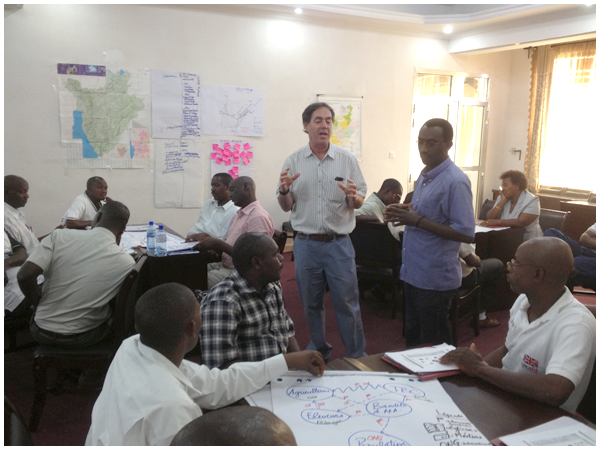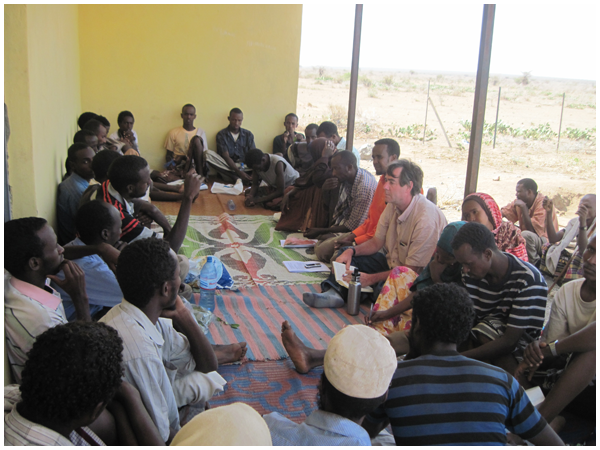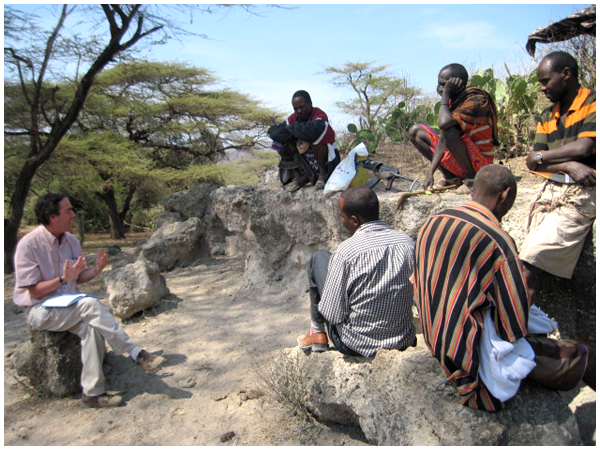Transformative Peacebuilding


Conflict Analysis Training in Burundi
Peacebuilding is a long-term communal process at all levels of society that facilitates the establishment of sustainable peace through activities that address the causes and effects of conflict, and promote security, justice, relative stability, and development on economic, political, social, and cultural levels. Important peacebuilding activities include: addressing underlying tensions and core grievances (structural, etc.) at an early stage before they lead to intractable conflict and violence; recovery after war; developing responsive institutions of governance; increasing citizen capacity and participation through strengthening community-based and non-government organizations; restorative justice; peace education for children and parents; open broad-based media; capacity-building in communication and problem-solving; mediation; dialogues; building linkages between key stakeholders at grassroots, middle, and top layers of society; inclusive cultural and sporting events, and community improvement projects benefitting all.
Over the years, as a peacebuilding specialist, Rev. Gary has been involved in many of the above activities related to the institutional and system dimensions of peacebuilding (and continues to do so). But in recent years, and especially since his ordination in 2011, Rev. Gary’s focus has evolved more toward the personal, spiritual and relational aspects of peacebuilding. A key emphasis of his work now is the integration of spirituality/faith, personal development, and peacebuilding.
This transformative peacebuilding approach seeks to facilitate sustainable peace and development on both personal and communal levels, by supporting fundamental growth and change in attitudes, values, awareness, perceptions, behaviors, along with relationships to self and others. It also includes examining personal and communal relationships and practices pertaining to faith and spirituality – whether they be religious, spiritual, or secular. Integrating this personal exploration onto the communal level, transformative peacebuilding aims to foster reconciliation and to build trust and common ground, heal the grievances and wounds of the past, and create new futures which honor people’s hopes and meet their basic needs. Specifically, the work addresses and seeks to reduce and overcome the dynamics and effects of social polarization, (“us vs. them”), trauma, fear, prejudice and stereotypes, especially between groups divided by race, ethnicity, religion, but also socio-economic and political divides.
Transformative Peacebuilding is also about transforming the peacebuilder, through a commitment to their own spiritual and emotional growth and then reflecting and integrating that personal work into their peacebuilding work. In this way, personal and societal peacebuilding are mutually reinforcing. (Similar to Andrew Harvey’s “Sacred Activism”)
Rev. Gary’s transformative peacebuilding services (which he does both locally and internationally) cover four main areas of work – Context and Design, Capacity-Building, Peacebuilding Intervention, Follow-up and Evaluation – each with specific activities, as follows:
Context and Design
-

Somali Interclan Dialogue
Needs Assessment: Understanding the needs and resources in a given conflict context involves more than the technical process of data collection, analysis, and dissemination. Rev. Gary’s focus is how to enter the context and engage with people, to develop trust, and understand their mindset, experiences, hopes and fears. It’s not just about asking the right questions, but to be able to reflect on the questions and answers together with people, to find common meaning and response.
- Conflict Analysis: To address conflict, we have to understand its often multifaceted reality, including its context, causes, issues, perspectives, dynamics, and, most important, the parties involved and their relationships. Conflict analysis is done through a series of tools, such as the context profile (political, economic, and socio-cultural information and emerging issues), conflict tree, and mapping of the conflict arena and its actors. Again, Rev. Gary pays particular attention to the relationship and connection with those who are providing the information which is critical to its accuracy and well as to any intervention response.
- Conflict Sensitivity: Community development projects (such as infrastructure, job creation, health care, education) do not operate in a vacuum, but rather in an existing context (history, politics, conflict, culture, relationships, etc.), and a project itself can affect that context. Regardless of how well-intentioned or needed a particular project might be, if it does not take into account the context nor its impact on the context nor address that impact, it can do more harm than good.
Conflict sensitivity is about 1) Understanding the context in which the project or intervention operates, 2) Understanding the interaction and impact between the intervention and the context, and 3) Acting upon the understanding of this interaction to mitigate negative impacts and maximize positive impacts. Being conflict sensitive means, being able to integrate (mainstream) peacebuilding or conflict prevention activities into the development intervention. And to do this with the policies and support functions of the development organization (procurement, finance, HR, knowledge management, etc), in order to address negative impacts.
“Do No Harm” is a specific conflict sensitivity model which focuses on understanding and addressing dividers and connectors. These are systems and institutions, attitudes and actions, values and interests, experiences, symbols, events that separate or bring together people in a given context.Rev. Gary designs and leads conflict sensitivity assessments of both projects and organizations, as well as capacity-building workshops (including in the “Do No Harm” model) and ongoing support work to increase conflict sensitivity in development work and peacebuilding in the communities served.
- Project Design and Proposal Development: In addition to comprehensive needs assessment and conflict analysis, Rev. Gary works on all aspects of project design and proposal development, and strives to incorporate a transformative peacebuilding perspective. These include formulation of project objectives, criteria, assumptions, risks, strategic alignment, sustainability, beneficiaries and community participation, partnerships, gender considerations, budgeting, staffing, work plans and timelines.
Capacity-Building
-

Clan Leadership Meeting in Ethiopia
Design and Facilitation of Training: The peacebuilding trainings that Rev. Gary offers generally range from 3 days to 10 days and features both personal development and practical skills training, including the following:
- Essential personal qualities (e.g. empathy and emotional self-awareness)
- Conflict analysis
- Conflict styles
- Communication – speaking and listening skills
- Negotiation and Mediation
- Trauma awareness and healing
- Trustbuilding; Reconciliation; Forgiveness
- Dialogue Facilitation
- Early warning / reducing tension / zones of peace
- Peace rituals
- Peace Visioning
- Entry Points
- Creating Culture of Peace
- Peacebuilder self-care
The training methodology is participatory, elicitive, and contextualized, with role play simulations of an actual conflict environment. There are presentations and discussions in the large group, along with small group work/presentations, and the development of action plans to be implemented after the training.
The peacebuilding training can be beneficial for most individuals and groups, including community-based organizations, non-governmental organizations, development workers, government officials and workers, and for the business community.
Click here for Outline of Somali Interclan Peacebuilding Training
Peacebuilding Intervention
- Reflective Conversation (Design and Facilitation)- an intra-group discussion (such as within an organization)that focuses on listening to one another to understand the perspectives, feelings, and experiences of the others in the group, to build connections and heal wounds, rather than mediation, agreement, or resolution of specific issues, though it can certainly be a step toward that. Click here for outline of “K” group Reflective Conversation
- Relationship-building dialogue (Design and Facilitation) a series of reflective conversations beginning on an intra-group level, and eventually between groups where there is mistrust and potential or actual conflict.
One area of strong interest for Rev. Gary is inter-spirituality dialogue and practice, which involves bringing together people of different faith beliefs and traditions, both lay people and clergy, to deepen understanding and connection between them.
These dialogues focus on telling our story and listening to the story of others, because this is the essential ground for relationship building. In addition, specific forms of engagement and interaction, including rituals and ceremonies, will take place to reinforce shifts in perception, attitude and goals.
Click here for Outline of Somali Interclan Relationship-Building Dialogue
- Third-Party Facilitation of Conflict: The exact form of third-party facilitation will depend on what the parties in conflict are asking for, as well as an assessment of the conflict context, the relationships, and what is most culturally appropriate and doable. Mediation may be appropriate but it is practiced in different ways in different cultures, particularly in terms of the authority of the mediator and his/her relationship with the conflicting parties. Many contexts or cultures have a history of indigenous conflict resolution and peacebuilding approaches that can be very effective. Rev. Gary starts by learning what traditional tools and practices are already present in a given context, and then will seek to strengthen them, if necessary, by integrating modern universal approaches. If he is in a context or culture other than his own, he will generally take a more indirect support role to the indigenous peacebuilders. If in his own context or culture, he will take more of a direct, leadership role. But in either case, his role will be to elicit the ideas and ways forward from the participants, rather than be prescriptive.
Follow-up and Evaluation
-

Somali Village Peace Meeting in Ethiopia
Training Follow-up Field Support: Rev. Gary provides follow-up field support to trainees to help reinforce and apply learning for both peacebuilding and conflict sensitivity. This can include assistance in implementing action plans, troubleshooting, counseling and mentoring, team cohesiveness, and additional training, as needed
- Monitoring and Evaluation: Via reviewing ongoing reports, observation, informant interviews and focus group discussions related to indicators, Rev. Gary does M & E field work and reports for both the context and the project intervention, with particular emphasis on personal development and relationship changes.
Presentations and Panels
Rev. Gary is available to give presentations or be part of a panel at public events, conferences, and seminars about any of the above peace building activities and themes.
For more information and fee schedules on Rev. Gary’s Transformative Peacebuilding work, including conflict analysis, design and facilitation of training, dialogues, reflective conversations, and presentations and panels, please contact him at: 802-229-1165 or gary@reverendgaryshapiro.com